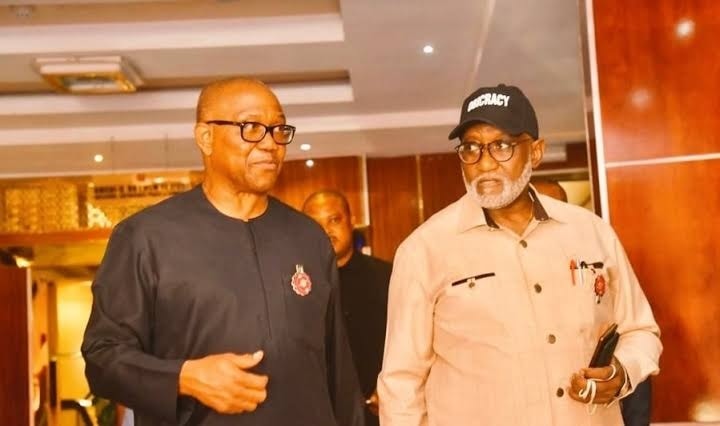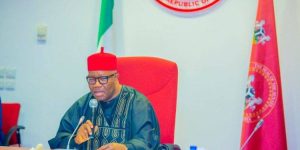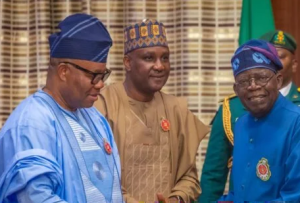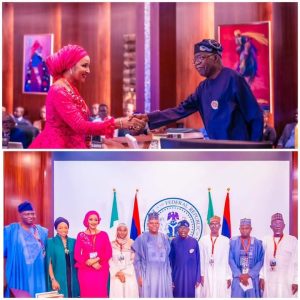Peter Obi’s Strong Ally, Oseloka Obaze, Dumps Labour Party: A Blow to the Obidient Movement?
The Labour Party in Nigeria has suffered a major jolt with the resignation of Oseloka Henry Obaze, a seasoned diplomat, political strategist, and one of the closest allies of its 2023 presidential candidate, Mr. Peter Obi. The news broke on Sunday, May 4, 2025, through a statement addressed to journalists in Anambra State, where Obaze confirmed that he had officially resigned from the party, citing irregularities and internal disarray.
For many observers, this move signals a deeper crisis within the Labour Party — one that may reshape the direction of the opposition as Nigeria inches closer to the 2027 general elections.
Oseloka Obaze is not just a former diplomat or bureaucrat; he is a key player in Nigeria’s contemporary political narrative. A respected technocrat, Obaze served as Secretary to the Anambra State Government from 2012 to 2015 during Peter Obi’s tenure as governor and that of his successor, Willie Obiano.
Prior to his foray into active politics, Obaze enjoyed a successful career in international diplomacy, including notable service with the United Nations. His return to Nigeria was marked by a strong desire to influence governance through institutional reforms, electoral credibility, and people-focused policy-making.
YOU MAY READ
Sanwo-Olu Slams Peter Obi Over U.S. University Comments: ‘Poverty Worsened, No School Or Hospital Built In Your 8 Years As Anambra Governor’
In 2017, he contested for governor of Anambra State under the platform of the People’s Democratic Party (PDP), a bid he lost. Nonetheless, his campaign style and public policy proposals earned him recognition as one of the most intellectually grounded political actors in the South-East.
Obaze’s political fate took a dramatic turn in 2022 when he resigned from the PDP, just a week before Peter Obi also left the party. His defection was viewed by many as a sign that Obi’s political base was shifting and that Obaze would play a central role in any new alliance.
Shortly after Obi joined the Labour Party, Obaze followed suit and was instrumental in shaping the Obidient Movement, a youth-driven political phenomenon that galvanized millions of Nigerians, particularly ahead of the 2023 general elections.
Obaze didn’t just stand behind Obi — he stood in for him. At one point, he was named the placeholder presidential candidate of the Labour Party during the negotiation phase. Later, he served as the de facto campaign manager and strategy lead for Obi, handling everything from media appearances to policy messaging.
In the heat of the campaign, Obaze was widely regarded as the intellectual backbone of the movement. His policy documents, speeches, and commentary helped give shape to what many described as the most issue-based presidential campaign Nigeria had seen in years.
According to the letter he addressed to his ward chairman in Ochuche Ward 406, Ogbaru Local Government Area, Obaze’s decision to leave the party was not taken lightly. The tipping point came during the Labour Party’s governorship primary election held on April 5, 2025, in Awka, Anambra State.
YOU MAY READ
Blocked from Compassion: The Peter Obi–Benue Saga and the Politicisation of Humanitarian Visits
Obaze described the process as being riddled with “outright irregularities, bordering on fraud and criminality.” He alleged that the primaries did not reflect the values of the party or the democratic standards it claimed to uphold.
In his own words:
“The processes, conduct, and outcome of the Labour Party governorship primaries held on April 5, 2025, in Awka were not in tandem with either the party’s constitution and espoused core values or true tenets of democracy. As such, I hereby disassociate myself henceforth from the Labour Party.”
Obaze’s statement is a damning indictment of the party machinery, particularly given his senior status within it. It raises questions about the internal democratic culture of the Labour Party, which gained national relevance largely due to its populist image and promise of a new political order.
Beyond the flawed primaries, Obaze also cited the protracted leadership crisis within the Labour Party as a major factor in his resignation. He referenced the ongoing dispute between the Julius Abure faction and that of Nenadi Usman, a former minister who now leads a splinter group claiming legitimacy.
This leadership struggle has significantly weakened the party’s cohesion and ability to plan for the 2027 elections. For a party that shocked the political establishment in 2023 by finishing third in the presidential race and winning several legislative seats, the internal chaos represents a dangerous regression.
The courts have yet to fully settle the legitimacy dispute between both factions, and the Independent National Electoral Commission (INEC) has remained largely silent on which group it recognizes. Meanwhile, party faithful and aspiring candidates are caught in the crossfire, uncertain of who to trust or follow.
YOU MAY READ
May God Help Us As We Aim to Achieve a New Nigeria Where We Do Not Politicize Everything”: Peter Obi Speaks After His Humanitarian Visit to Benue State Was Blocked
Obaze’s exit adds to a growing list of prominent figures who are becoming disillusioned with the Labour Party’s internal wrangling. His departure also deprives Peter Obi of a strategic ally with deep roots in Anambra politics, national connections, and diplomatic finesse.
The Obidient Movement was never just a Labour Party affair. Though birthed through Peter Obi’s candidacy, the movement quickly evolved into a socio-political awakening for millions of Nigerians, particularly the youth. It pushed back against the traditional political establishment, championed good governance, and called for electoral reform.
However, with the Labour Party descending into factionalism and now losing some of its brightest minds, questions are being raised about the future of the movement.
Obaze’s resignation could be seen as a symbolic break from the status quo within the Labour Party — a sign that the ideals that powered the Obidient Movement are at risk of being compromised by the same political habits the movement set out to defeat.
Though Peter Obi has not made any public comment about Obaze’s resignation, political insiders suggest the former presidential candidate is deeply concerned about the direction of the party. With 2027 approaching, he is reportedly exploring new alliances and may even consider founding a new political platform if internal reforms in the Labour Party fail
Anambra is one of the political strongholds of Peter Obi and by extension, the Labour Party. The state delivered significant votes for Obi in the 2023 presidential election, and its political terrain has remained largely sympathetic to the Obidient cause.
With Obaze now out of the picture, the Labour Party’s grip on the state could loosen. He was one of the few leaders with both intellectual gravitas and grassroots appeal. His departure may embolden other disenchanted members to follow suit, especially those who feel the party’s promises have not materialized into real structural change.
Moreover, other parties, particularly the All Progressives Grand Alliance (APGA) and the People’s Democratic Party (PDP), may exploit the situation to reclaim lost ground.
Obaze’s resignation touches on a deeper, more systemic issue in Nigerian politics — the lack of internal democracy and institutional integrity within political parties. Whether APC, PDP, LP, or the smaller platforms, party primaries are often marred by manipulation, imposition of candidates, vote-buying, and factional conflict.
What makes Obaze’s protest stand out is that it comes from someone known for integrity, discipline, and a commitment to reform. His exit is not just a personal decision; it is a political statement against a system that resists transparency and fairness.
It also reopens debates on whether political reform in Nigeria should begin at the party level — with stricter regulations, third-party audits of primaries, and INEC-supervised internal elections.
For now, Obaze has not indicated his next political destination. Some speculate that he may retire from partisan politics altogether and return to advocacy, consultancy, or international work. Others believe he might remain an Obi loyalist in spirit, working behind the scenes to support broader reform efforts outside party lines.
Given his record, it’s unlikely that Obaze will join any of the traditional political parties without major reforms. Instead, he may lend his voice to citizen-led democratic movements or policy think tanks that seek to rebuild Nigeria’s civic space.
Regardless of what he chooses, his voice will remain important in the national discourse.
Oseloka Obaze’s resignation from the Labour Party is not just the story of a man leaving a political organization. It is the story of a party at a crossroads and a country still in search of true democratic ethos.
For the Labour Party, this is a loss — of credibility, of talent, and of momentum. For Peter Obi, this is a wake-up call. The movement he inspired cannot afford to lose its moral center. And for Nigerians, this is a reminder that real political change goes beyond slogans and social media hashtags — it demands systems, integrity, and sacrifice.
As 2027 looms, the choices political actors make now will determine whether Nigeria’s emerging political consciousness translates into real governance reforms or fades into disillusionment.
The resignation of Oseloka Obaze is a mirror. Whether the Labour Party — and by extension, the Nigerian opposition — chooses to look into it and reflect honestly will shape the next chapter of Nigeria’s democratic experiment.





